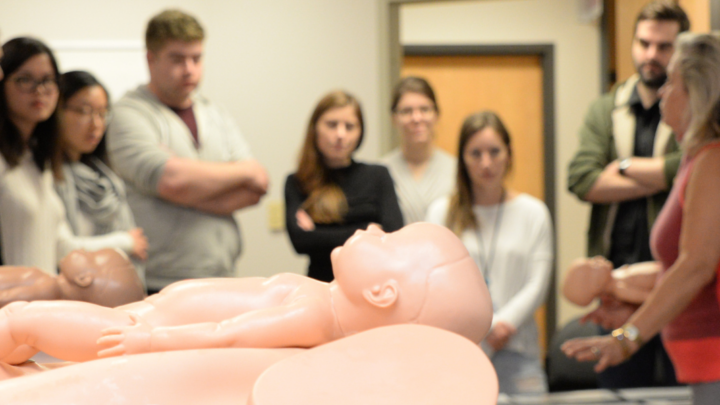Our strengths include:
- Strong commitment to continued enhancement of our program through continued curriculum review, innovation and development
- Strong research program
- Excellence in surgical training
- Relatively small program, which allows for more continuity in training
The program provides training in general obstetrics and gynecology, as well as the subspecialties of maternal fetal medicine (including ultrasound and prenatal diagnosis), gynecologic oncology, reproductive endocrinology/infertility, urogynecology, sexual medicine and minimal access surgery. Learn more about the APGO Comprehensive Exam – UWise
Expandable List
The postgraduate education program in obstetrics and gynecology at McMaster University is designed to train residents to practice as competent generalists in obstetrics and gynecology and successfully complete the Royal College of Physicians and Surgeons’ qualifying examination. For most residents, the training program will be five years in length. Completion of the entire program depends on satisfactory completion of each of the components within the program.
The residency training program in obstetrics and gynecology at McMaster University is a competency-based program consisting of rotations at three of the hospitals in the city of Hamilton and the many hospitals in the surrounding communities. The hospitals in Hamilton are themselves coordinated in a series of regional programs that concentrate specialized facilities at certain hospitals and provide mutual support for other specialized facilities, which are needed at all hospitals. The results are that the residents receive a great variety of clinical experience from the large referral base.
The program uses the Entrusted Professional Activities (EPA) list developed by the specialty committee of the Royal College as a basis for evaluation. Additionally, using the CanMEDS framework, the postgraduate program in obstetrics and gynecology at McMaster University has additional goals and objectives for each of the rotations that we feel are critical for competence in training as a consultant in the specialty. A minimum standard for performance in all CanMEDS domains, along with successful completion of all EPAs, is necessary to merit advancement in the residency program.
The residency program is arranged on a five-level basis, with each level usually equated to one year in the program. The program is problem-centred and experience-based: residents carry out their duties and responsibilities under faculty supervision. As the resident progresses through the program, the level of supervision decreases and the degree of autonomy increases.
The first postgraduate year (PGY1) is a broad-based clinical year, in which residents develop foundational skills with broad applications. The PGY2 year focuses on the attainment of general obstetrical and gynecological knowledge and skills. The PGY3 and PGY4 years of the program are structured around the development of skills pertaining to the sub-specialty areas. The final PGY5 year involves time performing as a chief resident and honing senior surgical expertise.
The Department of Obstetrics & Gynecology Postgraduate Education Committee is composed of:
- Residency Program Director
- Department Chair
- Faculty Research Coordinator
- Maternal Fetal Medicine Fellowship Program Director
- Local and Regional Hospital site Coordinators
- Department Associate Chair
- Resident representative from each year
This committee meets monthly to discuss topics relating to the day-to-day running of the program and any upcoming changes. Residents have a strong voice on the committee to help effect changes in the program.
There are elective opportunities available in general obstetrics and gynecology, as well as the subspecialty areas. Students, clerks and residents outside of the McMaster obstetrics and gynecology program who are looking for elective opportunities should contact the Residency Program Administrative Assistant.
For more information, contact:
Information Box Group

Sapna Sharma
MD, FRCSC
Associate Professor, Postgraduate Education Director
Maternal Fetal Medicine
Note: All applications to the residency program MUST go through The Canadian Resident Matching Service (CaRMS), Centre for Evaluation of Health Professionals Educated Abroad or McMaster Postgraduate Medical Education (for outside funded applicants only). We do not accept any applications sent directly to the office.

